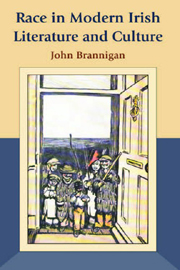Book contents
- Frontmatter
- Contents
- Illustrations
- Acknowledgements
- Introduction
- 1 1922, Ulysses, and the Irish Race Congress
- 2 Face Value: Racial Typology and Irish Modernism
- 3 ‘Aliens in Ireland’: Nation-building and the Ethics of Hospitality
- 4 ‘Ireland, and Black!’: The Cultural Politics of Racial Figuration
- Conclusion: Imagining the ‘New Hibernia’
- Bibliography
- Index
3 - ‘Aliens in Ireland’: Nation-building and the Ethics of Hospitality
Published online by Cambridge University Press: 12 September 2012
- Frontmatter
- Contents
- Illustrations
- Acknowledgements
- Introduction
- 1 1922, Ulysses, and the Irish Race Congress
- 2 Face Value: Racial Typology and Irish Modernism
- 3 ‘Aliens in Ireland’: Nation-building and the Ethics of Hospitality
- 4 ‘Ireland, and Black!’: The Cultural Politics of Racial Figuration
- Conclusion: Imagining the ‘New Hibernia’
- Bibliography
- Index
Summary
In the opening scenes of John Ford's classic film, The Quiet Man (1952), the quality of hospitality appears to be conditional upon protocols of familial and communal recognition. As Sean Thornton emerges from his train – three hours late – on to the platform of Castletown, a crowd of railway staff and bystanders react with puzzlement to his arrival, anxiously querying his intentions, and mistaking him for a foreign tourist bent on fishing. It is only when he reveals to his hired driver, Michaeleen, the identity of his father and mother, and that he was born in the local village of Innisfree, that it is clear he is a returning migrant, and not an American tourist. The passage from foreigner to native is repeated in the scene in the bar in which Thornton's greeting and offer to buy drinks is met with hostile silence until a village elder establishes Thornton's local pedigree. As a native, Thornton is immediately re-integrated into the rituals of the community. A crowd instantly gathers around him singing the Irish-Australian rebel song, ‘The Wild Colonial Boy’, and stands by him against the seething hostility of the local ‘squireen’. The parish priest, too, welcomes him back into the community upon learning of Thornton's genealogy by telling him to be at mass the following morning at seven. Ford's film goes on to dramatise the struggle between Thornton and the squireen to be the local übermensch, one forged in the steel factories and boxing clubs of Pittsburgh, the other in the agrarian labour of an Irish farm.
- Type
- Chapter
- Information
- Race in Modern Irish Literature and Culture , pp. 144 - 178Publisher: Edinburgh University PressPrint publication year: 2009



